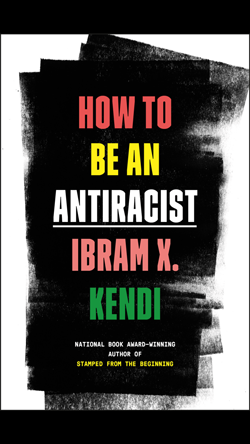
by Ibram X. Kendi, PhD. |
What does it mean to be an antiracist?
Michael Hyter, chief diversity officer at Korn Ferry and facilitator of the Campus Conversation on the book, How to Be an Antiracist, on Thursday, Nov. 5, said the author, Ibram X. Kendi, PhD, is leading the national conversation on the issue.
“Racism is the fastest growing fatal cancer humanity has ever known. And this professor has done a phenomenal job through his book in redefining racism and our responsibility in addressing it,” said Hyter.
Dr. Kendi, an award-winning author and one of the nation’s leading scholars and historians of racism, recently joined Boston University as a professor and founding director of the BU Center for Antiracist Research. Hyter summarized Kendi’s definitions that “a racist is one who is supporting a racist policy through their actions or inaction or expressing a racist idea. . . . An antiracist is one who is supporting an antiracist policy through their actions or expressing an antiracist idea.”
Hyter continued that Kendi asserts, “The opposite of racist isn’t not racist. The opposite of racist is antiracist.”
“I think it’s very clear from the work of Dr. Kendi that being an antiracist implies action,” said panelist Sharina Person, PhD, professor of population & quantitative health sciences. She described how she no longer gives racist language a pass in personal interactions but, in a recent example, engaged the person over misconceptions he had about race.
“Kendi has said in the book that being an antiracist is not a noun. It’s a verb,” agreed Jeroan Allison, MD, MS, chair and professor of population & quantitative health sciences.
Dr. Allison said that his department undertook an assessment and, “We found some things that brought a tear to my eye. And so, as a result, Sharina was commissioned to establish a diversity action committee that is actually addressing policies and procedures for our department.”
The discussion delved into Kendi’s assertion that race is not a social construct; it is a power construct. The author suggests that antiracist action focuses on policies and systems, versus individuals.
Milagros Rosal, PhD, professor of population & quantitative health sciences and vice provost for health equity, said antiracist efforts would be more powerful if they were respectful and sought to educate, not blame. She added that such an approach would also prevent backlash.
“One of the ways that I find really helpful to think about this is to focus on impact, rather than intention,” said Mary Ellen Lane, PhD, dean of the Graduate School of Biomedical Sciences. She said no one likes to think of themselves as a racist or bigot. They are much more open to feedback when someone has pointed out the personal impact of what the other has done.
Kenneth Peterson, PhD, assistant professor of nursing and co-chair of the UMMS Committee on Equal Opportunity and Diversity, said antiracist work can be challenging for health care professionals. “You have to interact with people in that place where the power is different, or in a place where you’re trying to establish a relationship. [And] maybe, you know, this might be the wrong approach. But I think sometimes you have to take it in steps.”
People tend to focus on racist acts of individuals, rather than systems, “because it’s just easier,” said Dr. Person. If the system is broken, “We all have something to do with fixing this, as opposed to those people over there.”
MD/PhD student and UMass trustee Peter Cruz-Gordillo called for more opportunities and training for students to talk about racism and to study it in policy contexts.
“I think that to change things, we need to start thinking about that really deeply, getting combined degrees in public policy and moving forward in that realm,” Cruz-Gordillo said. “I think that we are training exceptional people in health professions and science that need to have a voice and an antiracist voice, to really start changing these things, if we’re going to get anywhere.”